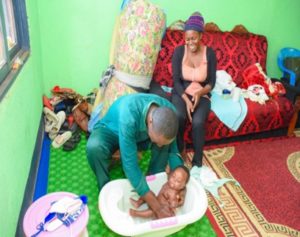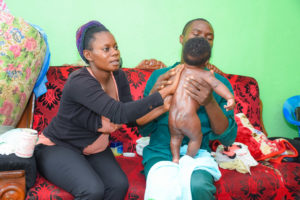 Despite tremendous efforts toward reducing maternal mortality worldwide, many women and newborns still die from preventable causes during pregnancy, birth, and postpartum. In Cameroon, maternal mortality ratio stands at 590 per 100,000 live births, and under-five mortality is 88 per 1000 live births. Just 62% of women get the WHO-recommended antenatal care (ANC), and postnatal care attendance is limited to 37%. Worse still, less than 21% of babies born in Cameroon are exclusively breastfed, contributing to the 33% stunted rate among under-five children. [WHO, 2015].
Despite tremendous efforts toward reducing maternal mortality worldwide, many women and newborns still die from preventable causes during pregnancy, birth, and postpartum. In Cameroon, maternal mortality ratio stands at 590 per 100,000 live births, and under-five mortality is 88 per 1000 live births. Just 62% of women get the WHO-recommended antenatal care (ANC), and postnatal care attendance is limited to 37%. Worse still, less than 21% of babies born in Cameroon are exclusively breastfed, contributing to the 33% stunted rate among under-five children. [WHO, 2015].
In many sub-Saharan African countries, gender disparity gives men an upper hand in several aspects, including their pregnant spouses’ pre-and postnatal care. The latter is highly determined by the financial and social support the men can give. They often have little interest and limited understanding of the need for antenatal and postnatal care. Therefore, men need to participate in the continuum of care for healthy birthing if mother-baby must survive and thrive.
The Paternity Clinic Project (PCP) sought to enhance the skills of first-time expectant fathers in limited resource settings on their role in achieving a healthy pregnancy and childbirth and as a way of avoiding preventable maternal and infant mortality.
This project reached 349 expectant couples between 2019 and 2021 with life-saving maternal, newborn, and child health education and follow-up within the North West Region of Cameroon. The responses were tremendous as many men accompanied their partners during labor into the delivery room. A good number encouraged their partners and practiced exclusive breastfeeding for six months. Many women reported receiving improved care, attention, and support from their partners.
Many women reported receiving improved care, attention, and support from their partners.
